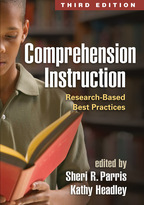Comprehension Instruction
Third Edition
Research-Based Best Practices
Edited by Sheri R. Parris and Kathy Headley
Foreword by Lesley Mandel Morrow
I. Comprehension Instruction within Theoretical Frameworks
1. Beyond Borders: A Global Perspective on Reading Comprehension, Sheri R. Parris, Linda B. Gambrell, and Andreas Schleicher
2. Comprehension Instruction from a Critical Theory Viewpoint, Bogum Yoon
3. Using Inquiry Dialogue to Promote the Development of Argument Skills: Possibilities, Challenges, and New Directions, Alina Reznitskaya, Judy Yu-Li Hsu, and Richard C. Anderson
4. Reading Comprehension, Embodied Cognition, and Dual Coding Theory, Mark Sadoski
5. Executive Function and Reading Comprehension: The Critical Role of Cognitive Flexibility, Kelly B. Cartwright
6. Metacognition in Comprehension Instruction: New Directions, Linda Baker, Laura U. DeWyngaert, and Alisa Zeliger-Kandasamy
7. Constructivist Theory as a Framework for Instruction and Assessment of Reading Comprehension, Donna Caccamise, Angela Friend, Megan K. Littrell-Baez, and Eileen Kintsch
II. Comprehension Instruction Contexts
8. Comprehension Instruction within the Context of the Common Core, Evelyn Ford-Connors, Dana A. Robertson, Christine Leighton, Jeanne R. Paratore, C. Patrick Proctor, and Michelle Carney
9. Using Neuroscience to Inform Comprehension Instruction, Sheri R. Parris and Cathy Collins Block
10. Comprehension Instruction in Culturally Responsive Classrooms: A Review of Research and Practice, Ellen McIntyre
11. New Insights on Motivation in the Literacy Classroom, Jacquelynn A. Malloy
12. Research on Response-to-Intervention Supplemental Interventions: Where’s the Comprehension Instruction?, Deborah MacPhee, Elizabeth Bemiss, and Diane Stephens
13. Comprehension Instruction for At-Risk Students, Irma F. Brasseur-Hock, Michael F. Hock, and Donald D. Deshler
14. Comprehension Instruction for English Language Learners: New Perspectives, New Challenges, Robert Rueda, Norman J. Unrau, and Elena Son
III. Comprehension Instruction in Action
15. Best Practices for Comprehension Instruction in the Elementary Classroom, Nell K. Duke and Nicole M. Martin
16. Fiction Comprehension Instruction: Attending to Characters’ and Readers’ Emotional States, Laura B. Smolkin and Erin M. McTigue
17. Improving Comprehension of Informational Texts in the Elementary Classroom, Lisa S. Pao and Joanna P. Williams
18. Best Practices for Comprehension Instruction in the Secondary Classroom, Douglas Fisher and Nancy Frey
19. Improving Comprehension of Fictional Texts in the Secondary Classroom, Tiffany Ohlson, Heather Monroe-Ossi, and Sheri R. Parris
20. Improving Comprehension of Informational Texts in the Secondary Classroom, Vicki A. Jacobs and Jacy Ippolito
IV. Multimodal Literacies and Comprehension
21. Multimodal Literacy: Best Practices for Comprehension Instruction, Sally Lamping
22. Beyond Differentiation: Multimodal Literacy Learning, B. P. Laster
23. Research on Instruction and Assessment in the New Literacies of Online Reading Comprehension, Jill Castek, Julie Coiro, Laurie A. Henry, Donald J. Leu, and Douglas K. Hartman
24. Reading Digital: Designing and Teaching with eBooks and Digital Text, Bridget Dalton and David Rose
25. Games and Comprehension: The Importance of Specialist Language, James Paul Gee
26. New Literacies and Comprehension: Resources for Educators, Jan Lacina
27. Summing Up: Putting Comprehension Instruction in Context, Kathy Headley & Sheri R. Parris



